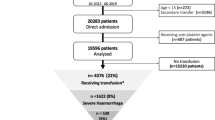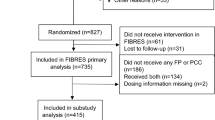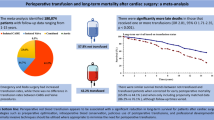Abstract
Purpose
To determine the independent relationship between leukoreduced platelet transfusions and adverse events in cardiac surgery.
Methods
In this observational study, detailed baseline and perioperative data were prospectively collected on consecutive patients who underwent cardiac surgery at a single institution from 1999 to 2004. The independent associations of platelet transfusion with clinical outcomes (low output syndrome, myocardial infarction, stroke, renal failure, sepsis, and death) were determined by multivariable logistic regression analysis and propensity score case-control analysis.
Results
Of the 11,459 patients analyzed, 2,174 (19%) received (leukoreduced) platelets -1,408 received 5 U, 471 received 10 U, 140 received 15 U, and 155 received 20 or more units. Although all measured adverse event rates were higher in those who received platelets, in neither the logistic regression analyses nor the propensity score analyses was there any association between platelet transfusion and any of the adverse events.
Conclusions
Transfusion of leukoreduced platelets in cardiac surgery is not associated with adverse clinical outcomes when adjustments are made for important confounders.
Résumé
Objectif
Déterminer la relation indépendante entre la transfusion de plaquettes réduites en leucocytes et les événements indésirables en cardiochirurgie.
Méthode
Dans une étude par observation, la cueillette prospective des données initiales et périopératoires détaillées a été faite pour des patients successivement opérés en cardiochirurgie dans un seul établissement entre 1999 et 2004. Les associations indépendantes entre transfusion plaquettaire et résultat clinique (syndrome de bas débit, infarctus du myocarde, accident vasculaire, insuffisance rénale, septicémie et mort) ont été déterminées par une analyse multivariée de régression logistique et une analyse cas-témoins du score de propension.
Résultats
Des 11 459 patients analysés, 2 174 (19 %) ont reçu des plaquettes réduites en leucocytes -1 408 ont eu 5 U, 471 ont eu 10 U, 140 ont eu 15 U et 155 ont eu 20 unités ou plus. Tous les taux ďévénements indésirables mesurés étaient plus élevés chez ceux qui avaient reçu des plaquettes, mais ni éanalyse de régression logistique ni éanalyse du score de propension n’ont montré ďassociation entre la transfusion de plaquettes et éun des événements indésirables.
Conclusion
En cardiochirurgie, la transfusion de plaquettes réduites en leucocytes n’est pas associée à des complications cliniques quand ďimportants facteurs de confusion sont corrigés.
Similar content being viewed by others
References
Vamvakas EC, Blajchman MA. Deleterious clinical effects of transfusion-associated immunomodulation: fact or fiction? Blood 2001; 97: 1180–95.
Raghavan M, Marik PE. Anemia, allogenic blood transfusion, and immunomodulation in critically ill. Chest 2005; 127: 295–307.
Vamvakas EC, Carven JH. Allogeneic blood transfusion and postoperative duration of mechanical ventilation: effects of red cell supernatant, platelet supernatant, plasma components and total transfused fluid. Vox Sang 2002; 82: 141–9.
Spiess BD, Royston D, Levy JH, et al. Platelet transfusions during coronary artery bypass graft surgery are associated with serious adverse events. Transfusion 2004; 44: 1143–8.
Karkouti K, Wijeysundera DN, Yau TM, et al. The independent association of massive blood loss with mortality in cardiac surgery. Transfusion 2004; 44: 1453–62.
Katz MH. Multivariable Analysis: a Practical Guide for Clinicians, 1st ed. Cambridge: Cambridge University Press; 1999.
Feinstein AR. Multiple logistic regression.In: Feinstein AR (Ed.). Multivariable Analysis: an Introduction. New Haven: Yale University Press; 1996: 297–330.
D’Agostino RB Jr. Propensity score methods for bias reduction in the comparison of a treatment to a non- randomized control group. Stat Med 1998; 17: 2265- 81.
Parson LS. Reducing bias in a propensity score matched-pair sample using greedy matching techniques. Proceedings of the Twenty-sixth Annual SAS® Users Group International Conference, Long Beach, CA, 2001.
Schlesselman JJ. Case-control studies: design, conduct, analysis. New York: Oxford University Press; 1982.
Allison PD. Logit analysis of longitudinal and other clustered data.In: Allison PD (Ed.). Logistic Regression Using SAS System: Theory and Application. Cary, NC: SAS Institute and Wiley; 1991: 179–216.
Boehlen F, Clemetson KJ. Platelet chemokines and their receptors: what is their relevance to platelet storage and transfusion practice? Transf Med 2001; 11: 403–17.
Spiess BD. Risks of transfusion: outcome focus. Transfusion 2004; 44: 4S-14S.
Corwin HL, AuBuchon JP. Is leukoreduction of blood components for everyone? JAMA 2003; 289: 1993–5.
Heddle NM. Universal leukoreduction and acute transfusion reactions: putting the puzzle together (Editorial). Transfusion 2004; 44: 1–4.
Stephan F, Hollande J, Richard O, Cheffi A, Maier-Redelsperger M, Flahautl A. Thrombocytopenia in a surgical intensive care unit: incidence, risk factors and outcome. Chest 1999; 115: 1363–70.
Itescu S, Tung TC, Burke EM, et al. Preformed IgG antibodies against major histocompatibility complex class II antigens are major risk factors for high-grade cellular rejection in recipients of heart transplantation. Circulation 1998; 98: 786–93.
Kristiansson M, Soop M, Saraste L, Sundqvist KGl. Cytokines in stored red blood cell concentrates: promoters of systemic inflammation and simulators of acute transfusion reactions? Acta Anaesthesiol Scand 1996; 40: 496–501.
Zallen G, Moore EE, Ciesla DJ, Brown M, Biffl WL, Silliman CC. Stored red blood cells selectively activate human neutrophils to release IL-8 and secretory PLA2. Shock 2000; 13: 29–33.
Buttnerova I, Baumler H, Kern F, et al. Release of WBC-derived IL-1 receptor antagonist into superna- tants of RBCs: influence of storage time and filtration. Transfusion 2001; 41: 67–73.
Lin JS, Tzeng CH, Hao TC, et al. Cytokine release in febrile non-haemolytic red cell transfusion reactions. Vox Sang 2002; 82: 156–60.
Spiess BD. Transfusion of blood products affects outcome in cardiac surgery. Semin Cardiothoracic Vasc Anest 2004; 8: 267–81.
Spahn DR. Strategies for transfusion therapy. Best Pract Res Clin Anaesthesiol 2004; 18: 661–73.
Smith RC, Leung JM, Mangano DT. Postoperative myocardial ischemia in patients undergoing coronary artery bypass graft surgery. S.P.I. Research Group. Anesthesiology 1991; 74: 464–73.
Author information
Authors and Affiliations
Corresponding author
Rights and permissions
About this article
Cite this article
Karkouti, K., Wijeysundera, D.N., Yau, T.M. et al. Platelet transfusions are not associated with increased morbidity or mortality in cardiac surgery. Can J Anesth 53, 279–287 (2006). https://doi.org/10.1007/BF03022216
Accepted:
Published:
Issue Date:
DOI: https://doi.org/10.1007/BF03022216




